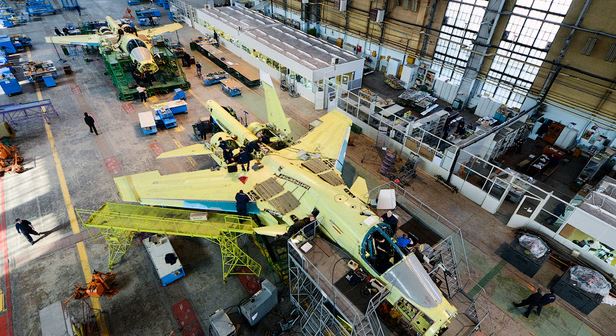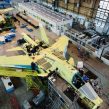
Putin’s ‘Self-Sufficient’ Defense Industry
Publication: Eurasia Daily Monitor Volume: 11 Issue: 99
By:

Russia’s President Vladimir Putin has placed increasingly high expectations and demands on the domestic defense industry. Putin intermittently reminds the heads of the various defense companies that the modernization plans to 2020 are unprecedented, spending 23 trillion rubles ($670 billion) in the process. However, following the impositions of Western sanctions, which have hit the high technology aspects of the Russian economy, Putin has returned to this theme with renewed urgency and vigor, raising the demands still higher by encouraging the defense industry to become “self-sufficient.” Unfortunately, it appears that the fundamental barrier in the path to achieving such aspirations is endemic corruption (Interfax, May 16).
Putin is well aware of the scale of the problems within the defense industry, and many of these issues are regularly publicized. The evidence that the ailing defense industry struggles to offer the necessary breakthroughs on defense ministry targets for modernization also exist in abundance. Perfect illustrations of this lie in the failures and delays in the design of the new Bulava Submarine Launched Ballistic Missile (SLBM), with the next test launch now scheduled for some time in the fall (ITAR-TASS, May 23). Another long-running issue within the defense industry relates to the saga of creating automated command-and-control systems (ASU). Although progress has been made on introducing the ASU, the Ground Forces are unlikely to see the system in service until 2015–2018, while the elite Airborne Forces receive their own version known as “Andromeda.”
These more high-profile cases reveal problems with price transparency, coordination between the defense ministry and defense companies, systems integration, and a host of additional complicating factors. But the omnipresent corruption in the defense industry is equally well documented. Western sanctions following Russia’s annexation of Crimea in March and the possibility that Moscow will find itself increasingly isolated in terms of international military-technical cooperation led Putin to order the defense industry to produce everything on Russian territory to avoid dependence on foreign states. Olga Bozheva considered the magnitude of this task in an article in Moskovskiy Komsomolets, drawing upon documents passed to the newspaper concerning checks by the General Prosecutor’s office in December 2013. Bozheva explained that, as a result of Putin’s drive toward defense industry self-sufficiency, the problems of “production efficiency” and corruption had come to the fore. To date, according to Bozheva, an entire class of “effective managers” has failed to deliver genuine self-sufficiency in the defense industry, while basing her article on documents that Moskovskiy Komsomolets has in its possession (Moskovskiy Komsomolets, May 15).
In February 2014, Bozheva also wrote on the basis of a document gleaned from the General Prosecutor’s office following a check on the United Aircraft Corporation (OAK) (Moskovskiy Komsomolets, February 16). Bozheva’s article on May 15 was based on a similar document, which concentrated on the more successful Russian Helicopters holding. The deliberate and timely leaking of such documents may well be important. She noted that these criticisms of such companies share similarities implying common systemic errors, which Bozheva asserts as applicable to the entire defense industry (Moskovskiy Komsomolets, May 15).
On the OAK weaknesses, the Prosecutor found that, despite state funding to restructure its debts, “the companies that are part of the corporation have deteriorated.” Checks on Russian Helicopters reached the same conclusion: “The results of our check testify that the Russian Helicopters JSC’s statutory tasks are not being fulfilled; individual companies within the holding company are on the verge of making a loss, and there is a heavy debt burden that is growing with every passing year. Debts owed on loans are frequently repaid through new loans… Despite holding a monopoly position on the Russian market in the sphere of the development and production of helicopter equipment, the Russian Helicopters JSC is not providing adequate competition for foreign-manufactured civilian helicopters” (Moskovskiy Komsomolets, May 15).
The prosecutor and other authorities found evidence of misappropriation and the presence of companies that had all the hallmarks of shell companies for hiding and moving money. The prosecutor’s document on Russian Helicopters added, “The Russian Helicopters JSC leadership, disregarding the statutory tasks imposed on it, de facto reduced the holding company’s activity to looking for sources to boost its own profits, primarily at the expense of subsidiary and dependent companies. The imposition on subsidiary enterprises of paid services that they did not need or that they could perform independently, without additional expenditure, became a consistent trend.” Money provided by the state was being used to inflate salaries for the top bosses and build modern offices, but not necessarily to boost helicopter repair or build new ones (Moskovskiy Komsomolets, May 15).
The unidentified individual who passed the documents to Bozheva explained that, frequently, such abuses and corruption flourish because no one within these companies wants to take responsibility and take appropriate decisions. “The point is that it is unclear. Nobody wants to take responsibility; everybody passes the buck to the president. And waits. Period. And meanwhile, they joyfully state that any Western sanctions will only benefit us. It is a chance to lift our economy off its knees—and the defense industry first and foremost” (Moskovskiy Komsomolets, May 15).
Despite the prosecutors’ investigation of these organizations and the numerous issues it exposed, Russian Helicopters took over five former defense ministry repair plants on May 23 (ITAR-TASS, May 23). The search for defense industry self-sufficiency may prove to be a step too far. But the documents passed to the Russian media from the Prosecutor General’s office suggest that senior managers are being reminded how fast the system can turn against them. Paradoxically, the Western sanctions on Russia may force Putin to pursue a serious and rigorous anti-corruption campaign to raise overall standards within the domestic defense industry.




